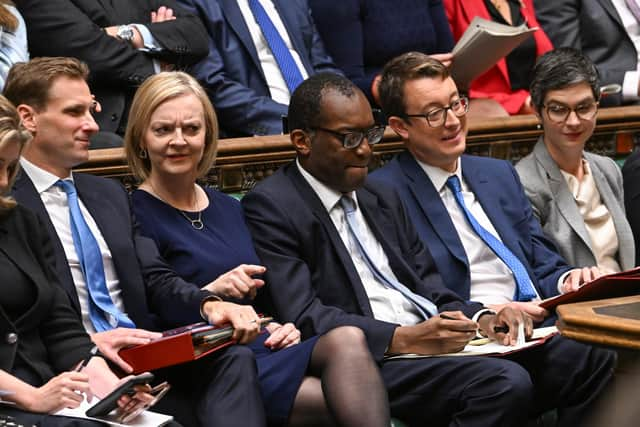RECAP: Liz Truss BBC radio: Follow how PM's local radio appearance unfolded
It is her first media appearance following the mini budget as the UK faces economic turmoil Ms Truss defended Chancellor Kwasi Kwarteng’s measures, insisting “urgent action” was needed, although she admitted the Government’s decisions have been “controversial”.
Prime Minister Liz Truss has insisted the Government had to “take urgent action to get the economy growing” in her first public comments since the mini-budget market turmoil.
Advertisement
Hide AdAdvertisement
Hide Ad

The market angst in recent days has seen the Chancellor step up efforts to reassure the City about his economic plans after the International Monetary Fund (IMF) criticised the Government’s strategy. Chief Secretary to the Treasury Chris Philp insisted there would be no consideration “at all” for a change of course by the Government.
On Wednesday, the Bank of England launched an emergency government bond-buying programme to prevent borrowing costs from spiralling out of control and stave off a “material risk to UK financial stability”.
The Bank announced it was stepping in to buy up to £65 billion worth of Government bonds – known as gilts – at an “urgent pace” after fears over the Government’s economic policies sent the pound tumbling and sparked a sell-off in the gilts market.
The market turmoil had forced pension funds to sell Government bonds to head off worries over their solvency, but this was threatening to see them suffer severe losses.
Here’s how it unfolded.
Liz Truss to face questions in first media appearance amid mini-budget turmoil
Good morning and welcome to our live blog following what has been a few difficult days for many in the UK amid market uncertainty and concerns over spiralling inflation.
Treasury chief secretary Chris Philp has confirmed Government departments will have to stick to existing spending limits despite rising inflation.
Mr Philp told Sky News that departments would be expected to find efficiency savings.
“The efficiency and prioritisation exercise is designed to firstly make absolutely sure we stick to those spending limits and secondly make sure that we are prioritising expenditure, not on anything that is wasteful, but on things that really deliver frontline public services and drive economic growth
“We are going to stick rigidly to those spending limits because it is important to be financially responsible.”
We can expect to hear from Truss from 8am.
Here are the timings 0800 Leeds, 0808, Norfolk, 0815, Kent, 0822, Lancashire, 0830, Nottingham, 0838, Tees, 0845, Bristol, 0852, Stoke.
The first question to the Prime Minister is “have you slept well” with the follow up question amid the market crisis being “where have you been?”
The PM tells BBC Radio Leeds that the country was facing an “economic slowdown” before “we took action” saying that “We had to take urgent action to get our economy growing, get Britain moving, and deal with inflation”
Truss says that her government is “working very, very closely with the Bank of England”
She cites national insurance reductions and moves to tackle fuel poverty.
As of yet the PM is really to address the market concerns and the mini budget issues.
BBC Radio Norfolk asks if Liz Truss is still confident in her policy - she says that the country must look at the situation it would be in if the government hadn’t acted.
“This is the right plan we have set out” insists Liz Truss after she is asked whether a good leader sticks to Plan A or changes course.
If you are just joining us - here is a summary of the interviews so far.
Prime Minister Liz Truss said the mini-budget was the “right plan”.
Liz Truss has defended Chancellor Kwasi Kwarteng’s mini-budget saying “urgent action” was needed to protect thee country from rising energy bills and to get the economy growing.
In her first public comments since Mr Kwarteng’s statement plunged the financial markets into turmoil, the Prime Minister told BBC Radio Leeds: “We had to take urgent action to get our economy growing, get Britain moving and also deal with inflation.
“Of course that means taking controversial decision but I am prepared to do that as Prime Minister because what is important to me is that we get our economy moving, we make sure that people are able to get through this winter and we are prepared to do what it takes to make that happen.”